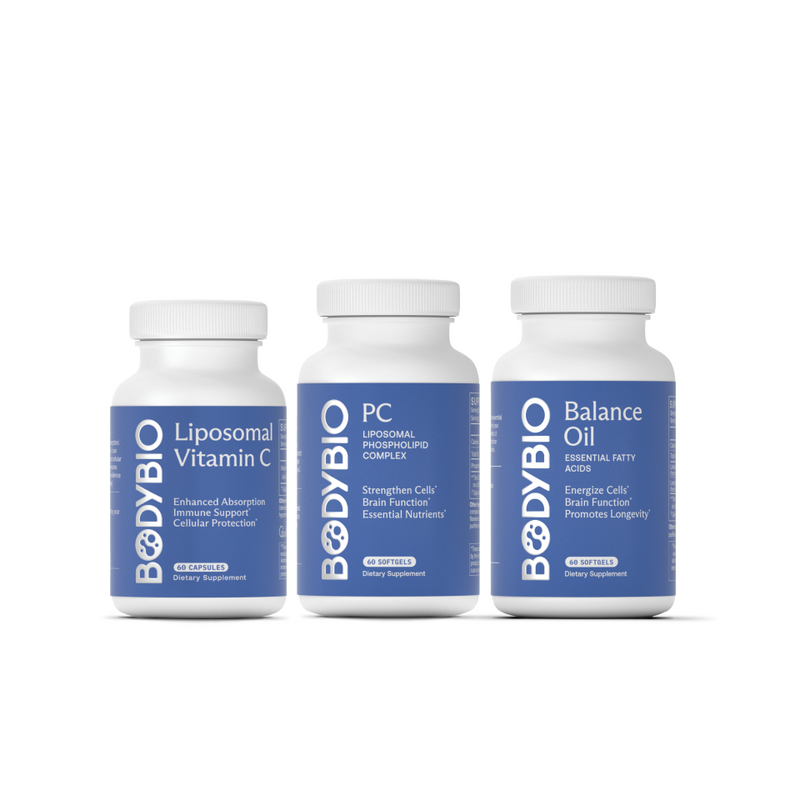Essential Vitamins for Dry Skin: Your Complete Guide to Hydrated, Healthy Skin
Authors:

Ashley Palmer
Nutritional Therapy Practitioner, Health & Wellness Expert
Featured Product:

SkinCell Essentials

SkinCell Essentials
Key Takeaways:
Your moisturizer isn't working. But not because it's bad. The problem isn't what you're putting on your skin, it's what's missing underneath, at the cellular level, where your skin cells either have the building blocks they need to hold water, or they don't.
More than 40% of U.S. adults are vitamin D deficient. When cells lack specific vitamins, they can't maintain the lipid matrix that seals in moisture. Can't produce enough collagen to keep skin plump. Can't regulate the inflammatory signals that turn simple dryness into chronic irritation.
So you get skin that flakes no matter how much cream you slather on. Tightness that's back 20 minutes after moisturizing. Rough patches that laugh at everything you try. That's what vitamin deficiency looks like from the outside.
But here's the part most people don't get: your skin's ability to stay hydrated starts with cellular health. When cell membranes don't have the right building blocks, phospholipids, essential fatty acids, and key vitamins, the whole barrier system falls apart. Water escapes faster. Irritants get in more easily. The dryness you see is just the visible end of cellular dysfunction you can't see. Winter makes everything worse, yes, (cold air, dry heat, barely any sun), but that's not actually the root cause. It’s time to look closer at your cell membranes for healthy, hydrated skin.
Table of Contents:
-
The Link Between Vitamins and Skin Hydration
-
Signs Your Skin Might Be Lacking Key Nutrients
-
The Top Vitamins That Help Treat and Prevent Dry Skin
-
How to Get More Skin-Loving Vitamins Through Diet
-
Supplements vs. Serums: What Works Best?
-
Build Hydration from the Cellular Level
The Link Between Vitamins and Skin Hydration
How Your Skin Barrier Actually Works
The outermost layer of your skin, the stratum corneum, works like a brick wall. Skin cells are the bricks. Lipids (fats) are the mortar holding everything together. When that lipid matrix breaks down, water escapes through something called transepidermal water loss (when water evaporates from the deeper layers of your skin).
Vitamins aren't just supporting hydration; they're directly involved in whether your skin can hold water at all.
Vitamin D regulates keratinocyte differentiation. That's the process where skin cells mature and form a working barrier. Research shows vitamin D deficiency directly messes with barrier function, especially in conditions like eczema and psoriasis, where the barrier's already struggling. Vitamin D also helps produce ceramides, which are the lipid molecules that literally seal the gaps between skin cells.
Vitamin E protects the lipid matrix from oxidative damage. It's a fat-soluble antioxidant that sits in your cell membranes, stopping free radicals before they destroy the fats your skin needs. Studies show vitamin E increases how much water your skin can actually hold onto, so skin holds moisture better.
Vitamin C is essential for collagen synthesis. Your body literally cannot make collagen without it. When vitamin C drops, collagen production slows, skin gets thinner and less elastic, and the dermis loses its ability to retain moisture.
What the Research Actually Shows
In one clinical study measuring vitamin D levels against skin hydration, researchers found a direct relationship: higher vitamin D meant higher skin moisture. People with low vitamin D had noticeably drier skin when they started supplementing, and skin hydration improved within three weeks.
Another study found that people with chronic inflammatory skin conditions have lower vitamin E levels—eczema, psoriasis, and acne. Less vitamin E means less protection for the lipid barrier, which means more water loss and dryness.
There are actually two types of dryness: hydration loss (not enough water in the outer layer) and inflammation-driven dryness (what you see in dermatitis). Missing vitamins contribute to both.
Signs Your Skin Might Be Lacking Key Nutrients
Persistent flaking. That rough, sandpaper feeling. Itching for no obvious reason. Redness that seems out of proportion to how dry things actually are.
Those are surface symptoms. Underneath? Compromised membrane integrity, not enough lipid production, slow collagen synthesis, or messed-up inflammatory signaling.
If your skin ticks multiple boxes and even good moisturizers barely help, you're probably dealing with a more significant internal issue.
You might also notice:
-
Cracks at the corners of your mouth, often due to a lack of B vitamins or bioavailable iron
-
Slow wound healing or skin that tears too easily—usually lacking vitamin C or zinc
-
Dry, brittle hair and nails, along with skin problems—lacking essential fatty acids or biotin
Should You Get Blood Work?
If dryness won't quit despite solid topical care, talk to your doctor or healthcare practitioner about micronutrient testing. Standard panels check vitamin D, vitamin E, B vitamins, zinc, and essential fatty acids. Blood work takes the guesswork out. You see exactly what's missing instead of randomly supplementing and hoping something works.
The Top Vitamins That Help Treat and Prevent Dry Skin
Vitamin D: Barrier Regulation at the Cellular Level
Vitamin D isn't just for bones. In your skin, vitamin D also controls how keratinocytes differentiate and build the skin barrier. Studies show vitamin D reduces transepidermal water loss by boosting ceramide production, those lipid molecules that seal gaps between cells.
Low levels (below 30 ng/mL) show up as dryness that topical products can't really fix. Most people start with 3,000-5,000 IU daily, though you might need more depending on your baseline and how well you absorb it.
Winter's especially rough on your skin. Less sunlight means your body makes less vitamin D, and most people don't get enough from food (fatty fish, egg yolks, dairy). If you're inside most of the day or live somewhere with short winter days, you basically need to supplement to meet your vitamin D needs.
Vitamin E: Protecting the Lipid Matrix
Vitamin E lives in your cell membranes, neutralizing free radicals before they wreck the fats your skin needs to stay hydrated. Clinical research shows topical vitamin E can boost skin hydration by up to 40% by strengthening the lipid barrier.
People with chronic inflammatory skin conditions tend to have lower vitamin E levels. When antioxidant protection drops, the barrier gets more vulnerable to oxidative stress, which speeds up lipid breakdown and water loss.
Vitamin C: The Collagen Cofactor
Your body can't make collagen without vitamin C. Period.
Research shows vitamin C cranks up type I and type III collagen production at the gene level, while also protecting existing collagen from breaking down. When collagen drops, skin gets thinner, less elastic, and structurally weaker, all bad news for moisture retention.
Vitamin C also works alongside hyaluronic acid, which can hold up to 1,000 times its weight in water.
Oral vitamin C (at least 500–1,000 mg daily) supports collagen from the inside. Topical vitamin C serums work locally; look for L-ascorbic acid or stabilized versions like sodium ascorbyl phosphate. BodyBio Liposomal C wraps vitamin C in liposomes (tiny lipid bubbles), which helps it actually get into your cells instead of just passing through your system.
Phospholipids and Essential Fatty Acids
These aren't technically vitamins, but we’re sneaking them in because they're probably more important for skin barrier health than any single vitamin.
Phospholipids, especially phosphatidylcholine (PC), are what cell membranes are made of. When membranes don't have enough phospholipids, everything breaks down.
Essential fatty acids like omega-6 linoleic acid and omega-3 alpha-linolenic acid keep membranes fluid and help produce anti-inflammatory compounds that calm irritated, dry skin. The ratio (4:1 omega-6 to 3) matters as much as the total amount.
Most commercial oils are heat-processed and oxidized, which makes them inflammatory instead of helpful. BodyBio Balance Oil uses cold-pressed, organic safflower and flaxseed oils in the 4:1 ratio research points to for membrane health and barrier function. BodyBio PC gives you phosphatidylcholine as well as other essential phospholipids, supporting membrane integrity throughout your body, including skin cells.
B Vitamins: Extra Barrier Support
Niacinamide (B3) boosts ceramide production in the stratum corneum, which reinforces the barrier. It also tamps down inflammation and regulates oil production without the drying effects you get from harsher ingredients.
Panthenol (B5) is a humectant; it pulls water into skin and keeps it there. Deeply hydrating, doesn't irritate, perfect for sensitive or compromised barriers.
How to Get More Skin-Loving Vitamins Through Diet
Food isn't just calories. It's the raw material your cells use to build membranes, make collagen, and maintain barriers.
Foods that actually help dry skin:
|
Nutrients |
Best Food Sources |
|
Vitamin D |
Fatty fish (wild-caught salmon, mackerel, sardines), egg yolks, UV-exposed mushrooms. Most people still don't get enough from food alone, especially in winter. |
|
Vitamin E |
Almonds, sunflower seeds, avocados, hazelnuts, spinach |
|
Vitamin C |
Bell peppers (more vitamin C than oranges!), strawberries, kiwi, broccoli, Brussels sprouts |
|
Vitamin A |
Sweet potatoes, carrots, dark leafy greens, egg yolks, organ meats |
|
B Vitamins |
Whole grains, legumes, nutritional yeast, shellfish |
|
Essential Fatty Acids |
Fatty fish, chia seeds, flax seeds, walnuts, organ meats |
Small Changes Add Up
You don't need to overhaul everything:
-
Add healthy fats to every meal (olive oil, avocado, nuts and seeds) so you absorb fat-soluble vitamins A, D, E, and K better
-
Go for whole foods over processed; ensure higher nutrient density in your meals
-
Toss a tablespoon of high-quality essential fatty acids into smoothies, soups, or salads.
-
Try organ meats occasionally like beef or chicken liver; they're incredibly nutrient-dense
Consistency beats perfection. You're not trying to eat perfectly. You're trying to give your cells steady access to what they need.
Supplements vs. Serums: What Works Best?
When to Use Supplements
Oral supplements are designed to fix systemic deficiencies. They help every cell in your body, not just your skin. Go with supplements when:
-
Your diet can't cover your nutrient requirements (like vitamin D in winter)
-
Blood work shows you're actually deficient in a nutrient
-
Dryness is chronic, and topicals alone aren't cutting it
-
You want to support cellular health from the ground up
When to Use Topicals
Topical vitamins give you fast, targeted relief for surface symptoms: flaking, rough texture, and acute dryness.
Use topicals when:
-
You need quick results for visible issues
-
You're dealing with specific problem areas (dry patches, rough elbows)
-
You're combining them with internal support for the best results
Look for products with vitamin E (tocopherols), vitamin C (L-ascorbic acid or stable versions), hyaluronic acid, niacinamide, and panthenol. Clinical studies show topical vitamin E can bump up moisture by 30%.
Want the best results? Combine both. Nutrients support cells from the inside, plus targeted topical care reinforces the barrier from the outside.
Build Hydration from the Cellular Level
When dry skin won't respond to topical care, it's almost always a cellular problem, not a surface one. When your cells have enough phospholipids, essential fatty acids, and key vitamins, they build stronger membranes. Stronger membranes mean better barrier function. Better barrier function means your skin actually holds the moisture you're trying to seal in with creams and serums.
The approach that actually works hits three levels:
-
Nutrient-dense whole foods that give your cells usable vitamins, minerals, and healthy fats
-
Targeted supplementation to fix confirmed deficiencies or fill gaps your diet can't cover (especially vitamin D in winter)
-
Quality topicals that support the barrier from the outside, while internal nutrition does the deeper work
This isn't about piling seventeen new products into your routine. It's about giving your cells what they need to do their job. When cellular health improves, skin health follows.
Tackle skincare at the cellular level with BodyBio’s SkinCell Essentials.*


